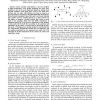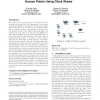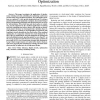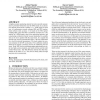134
click to vote
ICCAD
2009
IEEE
14 years 12 months ago
2009
IEEE
Clock skew scheduling has been effectively used to reduce the clock period of sequential circuits. However, this technique may become impractical if a different skew must be appli...
119
click to vote
WICON
2010
14 years 12 months ago
2010
Clock skew is defined as the rate of deviation of a device clock from the true time. The frequency of a device's clock actually depends on its environment, such as the tempera...
130
click to vote
SENSYS
2010
ACM
14 years 12 months ago
2010
ACM
To achieve more accurate global time synchronization, this paper argues for decoupling the clock distribution network from the routing tree in a multihop wireless network. We find...
118
click to vote
ICCAD
2010
IEEE
15 years 1 days ago
2010
IEEE
Clock networks contribute a significant fraction of dynamic power and can be a limiting factor in high-performance CPUs and SoCs. The need for multi-objective optimization over a l...
117
click to vote
ICCAD
2010
IEEE
15 years 1 days ago
2010
IEEE
Clock network construction is one key problem in high performance VLSI design. Reducing the clock skew variation is one of the most important objectives during clock network synthe...
134
click to vote
DAC
2010
ACM
15 years 3 days ago
2010
ACM
Clock meshes are extremely effective at filtering clock skew from environmental and process variations. For this reason, clock meshes are used in most high performance designs. Ho...
109
click to vote
ASPDAC
2010
ACM
15 years 3 days ago
2010
ACM
Abstract--In nanometer-scale VLSI physical design, clock network becomes a major concern on determining the total performance of digital circuit. Clock skew and PVT (Process, Volta...
155
click to vote
TMC
2010
15 years 13 days ago
2010
We explore the use of clock skew of a wireless local area network access point (AP) as its fingerprint to detect unauthorized APs quickly and accurately. The main goal behind usi...
121
click to vote
TCAD
2002
15 years 1 months ago
2002
Abstract--This paper investigates the application of simultaneous retiming and clock scheduling for optimizing synchronous circuits under setup and hold constraints. Two optimizati...
111
click to vote
SIGMETRICS
2002
ACM
15 years 1 months ago
2002
ACM
A highly accurate monitoring solution for active network measurement is provided without the need for GPS, based on an alternative software clock for PC's running Unix. With ...





